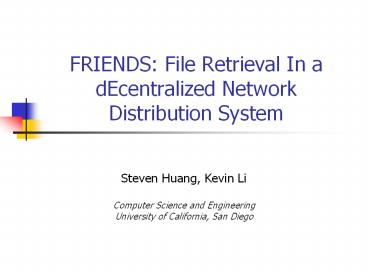FRIENDS: File Retrieval In a dEcentralized Network Distribution System - PowerPoint PPT Presentation
Title:
FRIENDS: File Retrieval In a dEcentralized Network Distribution System
Description:
Illegal file sharing has drawn negative publicity. P2P systems ... Kazaa, Grokster, Morpheus. Hierarchy of nodes like DNS. Bandwidth is not well distributed ... – PowerPoint PPT presentation
Number of Views:52
Avg rating:3.0/5.0
Title: FRIENDS: File Retrieval In a dEcentralized Network Distribution System
1
FRIENDS File Retrieval In a dEcentralized
Network Distribution System
- Steven Huang, Kevin Li
- Computer Science and Engineering
- University of California, San Diego
2
FRIENDS
- Motivation
- Related works
- Initial approaches
- Implementation
- Future work
3
Peer-to-peer File Sharing
- Illegal file sharing has drawn negative publicity
- P2P systems have nice features
- Low barrier of entry
- Aggregates computation and storage on large scale
- Robust, secure
4
Early P2P File Distribution Systems
- Napster (http//www.napster.com)
- Uses central database
- reliability issues
- Gnutella (http//www.gnutella.com)
- Uses broadcast
- Not scalable
- Kazaa, Grokster, Morpheus
- Hierarchy of nodes like DNS
- Bandwidth is not well distributed
- Reliability issues
5
More P2P File Distribution Systems
- Freenet Clarke, 2000
- Focus on anonymity, files get lost
- BitTorrent (http//www.bittorrent.com)
- Focus on distributing file to many peers
- Not fully decentralized, requires tracker
6
Related Works
- Recent popularity has resulted in lots of
research in P2P - Focus is on scalability, balance, flexibility
- Overlay Networks
- CAN RATNASAMY, 2001
- Chord STOICA, 2001
- Pastry ROWSTRON, 2001
- Tapestry HILDRUM, 2002
- Object Integrity unchecked
7
Related Works
- MD5
- Replication
- Reputation Management
- Distributed EigenTrust Kamvar, 2003
- Distributed Hash Tables
8
Research Question
- How can a fully decentralized P2P file
distribution network support the verification of
object integrity in a hostile environment?
9
Initial Approach
- Global table of file names with hash values
- Not decentralized, not scalable
- Use time of object entry as indicator of file
validity - Malicious nodes can tamper with time
- Bootstrap to physically close node using IP
address - Avoid multiple malicious nodes connecting to each
other - Reduces overall bandwidth
- Scalability issues, limited view of network
- Use a single MD5 value per file
- Waste a lot of bandwidth downloading 99 of an
invalid file
10
FRIENDS System Implementation
- Built using MACEDON
- MACEDON hides low level details allowing us to
focus on higher level research questions and
reducing code - Built protocol on top of Chord
- Pros Scalable, de-centralized, supports
distributed index - Cons Overlay network lacks bandwidth
optimizations - Focus is on proof of concept rather than
performance
11
FRIENDS System Details
- Verification needs to be done client size since
anyone can be an adversary - Each unique object in the system has a set of MD5
hash value associated with it - Files are broken up into 512kB sized chunks, with
an associated MD5 value - There is also an MD5 of all the MD5s which serves
to reduce bootstrapping costs - After downloading a portion of a file, run the
object through the given hash function to verify
the data is correct - Reputation system limits downloads from malicious
nodes
12
Distributed Hash Table
- Use a Distributed Hash Table to store the global
table of object to hash value. - Upon entering the system, the node will calculate
the hash values of any new objects it wishes to
add to the system - Hashing greenday basketcase sends file
information to node for greenday and node for
basketcase
13
Can I trust you?
- Malicious users can target the system in a number
of ways - Incorrect routing checks can be made to ensure
progress - Hosting invalid files MD5 hashes ensure that
the file being retrieved is the file desired - Corrupted Hash Table solved with replication
across multiple nodes - Malicious nodes can still affect a cooperative
node by wasting its time and bandwidth
14
Blacklisting
- Keep a rating of nodes that have hosted
downloaded objects. - Each successfully hashed object increases that
nodes rating (1) - Failed hash decreases it (-5)
- Filter potential sources against personal
reputation records - Friends trust friends
- Increase rating of nodes trusted by trusted nodes
- Exponential back-off
15
Future Work
- Replication
- Square-root replication Lv, 2002 Optimal
number of replications 1/? (Svqi)2 where qi is
the request frequency of object I and ? is the
average number of replicas per site - Bandwidth comparison tests using ModelNET
- Improve file name indexing
- Exploit locality to optimize bandwidth
16
Questions?































